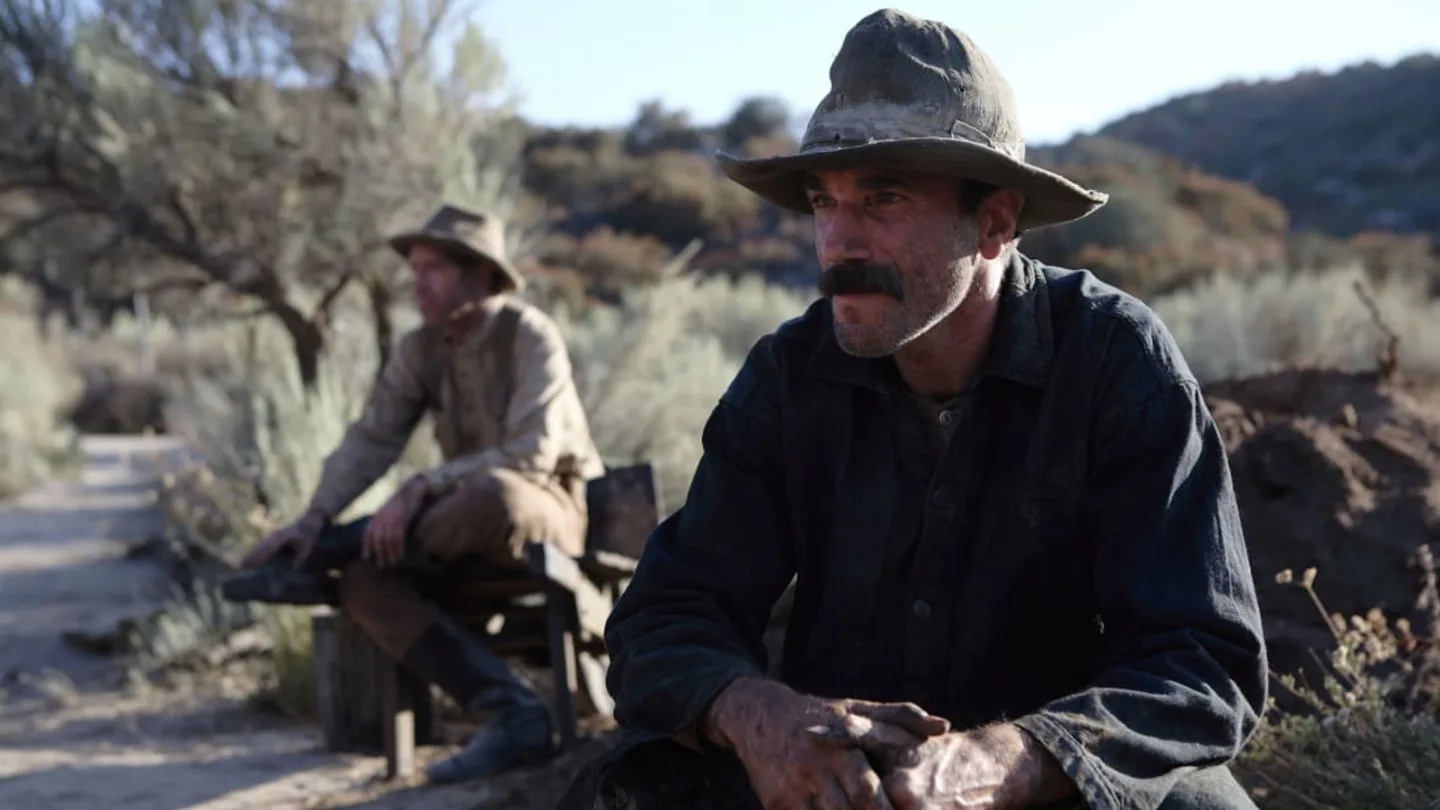there will be blood review
film by P.T. Anderson (2007)
Similar to the old boxing posters at the turn of the century, the film presents us with an alluring promise – “there will be blood,” by pitting two combatants against one another in a gladiatorial spectacle of man’s unrelenting drive toward dominance. Capitalism and Christianity, the two major building blocks of colonial American history, are juxtaposed forces, each represented by their corresponding, unforgettable, and formidable adversaries. Paul Thomas Anderson conjures a sweeping cinematic collision of these two forces in his 2007 epic masterpiece.
Review by Aaron Jones | April 5, 2024
The story begins with a placid and eerie opening scene comprising 20 minutes of dialogue-free drama, revealing the origins of the film’s protagonist, Daniel Plainview (played by Daniel Day-Lewis), a self-made man whom we see pulling himself out of the subterranean depths of the earth to emerge as a successful bastion of capitalism. Perpetually reminded of his own resilience by a limp acquired from a mining injury, Plainview symbolizes the start of the machinations of capitalism, adorning him with success as a result of his struggles.
Loosely based on the 1927 book Oil! by Upton Sinclair about family corruption in the oil industry, which serves more as a source of inspiration, as it only utilizes the beginning of the book for its adaptation. Anderson also uses the robber barons of America’s Gilded Age as an additional source of inspiration. However, he skillfully avoids the idealized and refined mustache-twirling caricatures donning the latest Edwardian fashions often associated with the prestigious names of the era, including Vanderbilt, Rockefeller, and Carnegie. Instead, he replaces them with a raw character study of the vile wickedness of a filthy, broken man brooding with macabre tenacity seldom equaled on screen.

Elevated by the extraordinary talents of both Lewis and Anderson, it’s hard to see the line where the script ends and the improvisation begins. A sinewy, crooked stick figure enraptured his audience with abysmal stares and sinister hatred that masterfully evokes those spectral fiends of silent-era films with a modern flair of realism. Daniel Plainview portrays a singular character who epitomizes the personification of American Capitalism. As such, it is not so much about who he is as an individual but more so what he represents as the archetype of the American capitalist businessman. Plainview’s presence is palpable in every scene through thematic structures of business dealings and male-dominated augmentations, contrasted with an almost total lack of female representation, with the exception of brief glimpses of church and domestic life. The film makes a strong point to show the lengths to which Plainview goes to avoid the trappings of church and home life, revealing a man lacking in the temperament of one who finds salvation in faith or community.
Having made a path for himself since the film’s opening through his natural ability to extract precious minerals and oil from the depths of the earth, Plainview’s expertise is not strictly limited to geology but is part of a skill set he is able to apply to the individuals who retain information vital to his success. He is armed with the experience of success in the face of adversity and an ironclad work ethic, summoning the hopes of those under the power of his persuasion, falsely inspiring his subjects who are blind to the politician of oil and beguiling adversary he is.
Through his understanding of the vulnerability of those prone to religious indoctrination, as well as the human tendency toward greed, Plainview is able to present himself as an authority whom the people can aspire to be, seeing themselves within arms reach of the same success, a final outcome which he has methodically designed.

With no false ambitions regarding his influence, Plainview’s superiority complex is observed via revelations of his intentions through his personal relationships to his relied-upon subjects, superbly demonstrated through the contrasting force of Eli Sunday (Paul Dano). Sunday, an evangelical preacher who shares many of Plainview’s most putrid qualities, is just as much a snake oil salesman struggling for the assertion of his dominance, with each of their “churches” on the frontline. Also a master of persuasion, Sunday dupes and ensnares his flock by performing faux miracles summoning the power of suggestion through his prepubescent serpentine convulsions and shrills, a tactic commonly utilized at revivalist gatherings in small towns all across the country around the turn of the 20th century.
Anderson pits these two forces against one another, each a slave to their gods, Capitalism and Christianity. Both are equally subservient to money and self-advancement achieved through similar means but with different applications. They share an unspoken similarity symbolized as shadowy reflections of one another. Each is a false prophet and minister of his own church who choreographs the submission of his subjects with formidable resolve, preying upon them for wealth or exaltation.
A pervasive and all-consuming disdain for humanity plays a central role in Plainview’s character that is woven into every fiber of his being. And, after a tragic accident that causes his son, H.W., to go deaf, his sense of alienation from and rage against the frailty of human emotions becomes the armor on which he must depend to keep him focused on his singular goal.

This is further realized through the appearance of Henry, a man claiming to be Plainview’s estranged brother. Despite Plainview’s monumental disdain for humanity, which he earnestly expresses to his “brother”, he goes against his own code and develops an affection for the man he believes to be his trusted kin. What manifests is a piercing revelation and further dissection of the limitations of Plainview’s empathy and the infernal hatred burning within him, which he assumes must be shared by Henry, exposing a twisted version of kinship and affection only reserved for family.
The trust he puts in Henry punctuates a vulnerability within Plainview: the desire for a legacy stemming from his inflated self-worth and obsession with being immortalized, a trait often found among the world’s wealthiest and most powerful figures. He uses Henry as a replacement for his maimed son, whom he abandons as he no longer sees H.W. as an adequate successor due to his disability. As the bond between the two men deepens, so too do the intimate details of their lives, eventually revealing a fissure. Though it is never spoken of, it is crafted in the tense montage of brooding figures amongst the ocean waves that build into a crescendo of formative restraint until its frightful and inevitable conclusion.
Burying his sins and facing his suppressed desire for some vestige of companionship, Plainview finds himself face to face with a vulnerability that will descend into humiliation at the hands of the preacher, Sunday. The scales of their struggle for dominance are momentarily tipped as Sunday forces Plainview to admit in the full presence of his church his culpability for abandoning his child, exposing his vulnerabilities in front of the very people he loathes through his pandering pronouncements.
However, the cyclical swing will find its way back into Plainview’s favor when the fuse for Eli’s attempted proselytizing and infractions is subliminally lit on screen, as he whispers something to Sunday that elicits a fearsome reaction which we can easily imagine is a promise or threat of some macabre action. The words are never audible, but their meaning is exposed through Sunday’s reaction, a brilliant way to subtly display Plainview’s rage and the twisted methods he will pursue to assert his will. This also reminds us of an earlier scene in which Plainview informs Paul (Sunday’s brother) that he will be taking back his money and exacting added retribution if Paul is lying about the prospects he has revealed to a man he just met. We can only assume the words whispered to Sunday carry a much heavier weight given their unfolding relationship and Plainview’s forced admittance of guilt over his own failures in front of the church and its worshipers.
Embodying the joylessness of man alienated and consumed by the toxicity of rage and greed, coupled with an inability to filter a temperament fueled by frustration and loathing, Plainview becomes the sole architect of his miserable fate. He begins to unravel in response to any obstacle proving more difficult than previously anticipated, with his hatred and greed as the catalyst of all that befalls him. Projecting his malevolence onto the motives of those around him, he is reduced to an alienated shadow of a man whose own self-destruction and abysmal descent leave him a twisted and threadbare heap of wreckage who only finds joy in isolation achieved by the elimination of obstacles.
A masterful depiction of rivalry, self-destruction, and the loss of humanity in the search for success and self-aggrandizement through baptisms of fire and greed inspired by capitalist Christian American values. Plainview’s story ends in the destruction of a once-valued family legacy, which he replaces with a benefaction of hatred and a desire to alienate himself from society after coming face to face with atonement in humiliating ways, depicting a symbiotic irony that is a fitting conclusion sardonically revealed in the film’s concluding line: “I’m Finished.”

Author
Reviewed and published by Aaron Jones. Based in California, he developed a passion for film from a young age and has since viewed over 10,000 films. Curently serves as a film critic at CinemaWaves, he has contributed to other publications as well. Feel free to follow him on Instagram and Letterboxd.
Take a look at more film reviews here on our website. Explore a variety of films that can help you decide your next movie pick.
